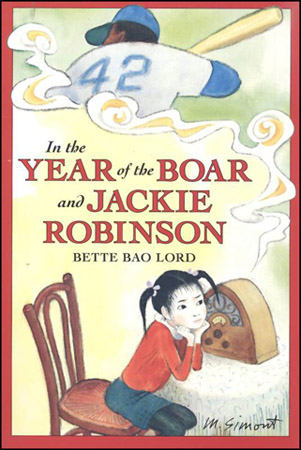Good Books
The Fortune of Change
Ivy F. DeShield, contributing editor

Long lines of yellow school buses with engines humming patiently in the front of school houses are the first signs. And then the turning leaves; it is always the slow rise of fall foliage in brilliant coats of red, orange and purple that best symbolizes the prolific winds of change to me. Nature has its seasons; books have their chapters; and we have the years, months, days and hours. Within each, change is a constant, ranging from a slight adjustment in perception to a journey of ten thousand miles. The certainty of change or transformation, whether at a snail’s pace or full speed, has led me to fully embrace its whims over the years and cherish my past, present and all the miracles in-between.
The destinies of change abound for Shirley Temple Wong (Bandit or Sixth-Cousin), a young Chinese immigrant in 1947 Brooklyn, in Bette Bao Lord’s “In the Year of the Boar and Jackie Robinson”. In the Year of the Boar, Shirley and her Mother arrive on the shores of Mei Guo (Beautiful Country) or America to reunite with her Father, a relocated engineer, who welcomes them with open arms to their new home. Initially excited by the tall buildings; flat, painted black streets; three-wheeled bicycles and the Brooklyn Bridge, Shirley soon begins to long for her beloved cousins and a more familiar world when her poor English, Chinese customs and petite stature do nothing to impress her American peers in Mrs. Rappaport’s fifth-grade class. Instead of friends, she gains two black-eyes when she mistakenly collides with Mabel, the “tallest and the strongest and the scariest girl in all of the fifth grade” as Mabel steals home base during a stickball game.
Yet, the winds of change are constantly blowing, and as Shirley’s Grandfather had told her repeatedly, “Things are not what they seem...Good can be bad. Bad can be good. Sadness can be happiness. Joy, sorrow.” And so it was with Shirley; her misery turns to bliss when Mabel, impressed that Shirley did not squeal, immediately befriends the young immigrant and welcomes Shirley into an exclusive world of stickball, roller skates and soda pop. And after accidentally stealing base during a game, Shirley’s new friends endearingly nickname her, Jackie Robinson, who she later learns is “the grandson of a slave, the son of a sharecropper, [and] the first Negro to play baseball in the major leagues”.
The author, Lord, makes a striking comparison between young Shirley and the Brooklyn Dodger’s baseball hero, Jackie Robinson, as Mrs. Rappaport explains to her class the significance of Robinson’s role in the major leagues and in America as an agent of change and a symbol of the freedoms of all humankind, no matter their race, religion or creed. Lord beautifully crafts a strong message via Shirley’s journey to young readers that they, like Shirley, have the right “to speak [their] mind, to live as [they wish] within the law...to make a difference. To change what has been. To make a better America”.
Shirley Temple Wong’s story of triumph in the face of change is based upon the author’s personal story when she first arrived in America. Like Shirley, Lord believed in the fortune of experience, saw her dreams come true and was “doubly-blessed” for it. I wish you good fortune as well in the days, months, and years ahead. Enjoy the read!
“In the Year of the Boar and Jackie Robinson” is an ALA Notable Children’s Book and winner of the Jefferson Cup Award (Virginia). Illustrations by Marc Simont.




